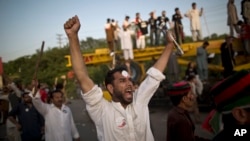Thousands of Pakistani riot police took up positions to defend a diplomatic and political zone of the capital on Tuesday after an opposition leader and cleric vowed to march on parliament to oust the prime minister.
Upping the stakes, the interior minister also announced that soldiers would be deployed to stop the protesters.
The announcement was intended to send a message to the coup-prone country that the protests do not have military backing.
It also underscored how the domestic opposition has forced the fledgling civilian government to rely on the country's powerful army, despite deep mistrust between the two institutions.
The protests have piled extra pressure on the 15-month-old government as it struggles to overcome high unemployment, daily power cuts and a Taliban insurgency. The showdown has also raised questions over the stability of Pakistan, a nuclear-armed nation of 180 million people.
Protest leaders
The protests are led by former international cricketer Imran Khan, head of the country's third-largest political party, and cleric Tahir ul-Qadri, who controls a network of Islamic schools and charities.
Khan accuses Prime Minister Nawaz Sharif of rigging last year's polls. Qadri accuses Sharif of corruption. Both want Sharif to resign.
Police estimate the two protest leaders have around 55,000 supporters between them.
Both Khan and Qadri have been holding protest rallies in the capital since Friday with government permission. But they have been banned from the “Red Zone,” which houses many Western embassies, parliament and the office and home of Sharif.
Their protests have so far remained separate because the two have different supporters and plans for what should happen if Sharif steps down.
Peaceful protest
But on Tuesday, Qadri said his supporters would march on parliament, a day after Khan asked his supporters to do the same.
“The people's parliament ... have decided to do their sit in in front of parliament,” Qadri announced on Tuesday evening, referring to his protesters, to approving roars from the crowd.
Most of Khan's supporters are young men. Qadri's supporters are seen as more disciplined and determined; there are many families among them. All the men have sticks; brigades of fluorescent youths also have goggles and masks to deal with teargas.
The Red Zone is sealed off with shipping containers and barbed wire and flooded with riot police and paramilitaries.
At Khan's rally, 20-year-old Shams Khan, who came from the northwestern region of Bannu with his friends, said the threat of violence would not deter him.
“My blood is boiling today and I want to be martyred,” he said. “If we don't go into the Red Zone today, I will quit this party tomorrow.”
Army to secure zone
Interior Minister Chaudhry Nisar announced the military would co-ordinate the defense of the Red Zone.
“The government has decided to handover the security of the Red Zone of Islamabad to the army,” he said in a news conference. “The enforcement on this will start in next two, three hours.”
Three tiers of security had been put in place, he said, using police and government paramilitary forces.
“This challenge to the writ of the state will not be acceptable under any circumstances,” Marvi Memon, a legislator from Sharif's party, told a news conference.
“By entering the Red Zone, what are you trying to prove?” she asked. “You cannot just go and sit on his chair and become prime minister.”
Pull out of parliament
On Monday Khan also announced his party, Pakistan Tehreek-i-Insaaf (PTI), would resign from their 34 seats in the National Assembly and in all provinces apart from Khyber Pakhtunkhwa, which his party controls.
Khyber Pakhtunkhwa, which borders Afghanistan, is the heartland of the Taliban insurgency.
Memon said no formal resignations had been received so far.
Some analysts say Khan and Qadri mounted their challenge because Sharif's relationship with the military had deteriorated, appearing to leave the civilian government isolated.
Sharif angered the military by delaying an anti-Taliban operation by insisting on months of fruitless peace talks and putting the former chief of staff, Pervez Musharraf, on trial for treason. Musharraf ousted Sharif during a coup in 1999.
Many officers are also suspicious of Sharif's strategy to improve relations with archenemy India. However, over the past weeks, Musharraf's trial has ground to a halt and talks with India have been canceled.





